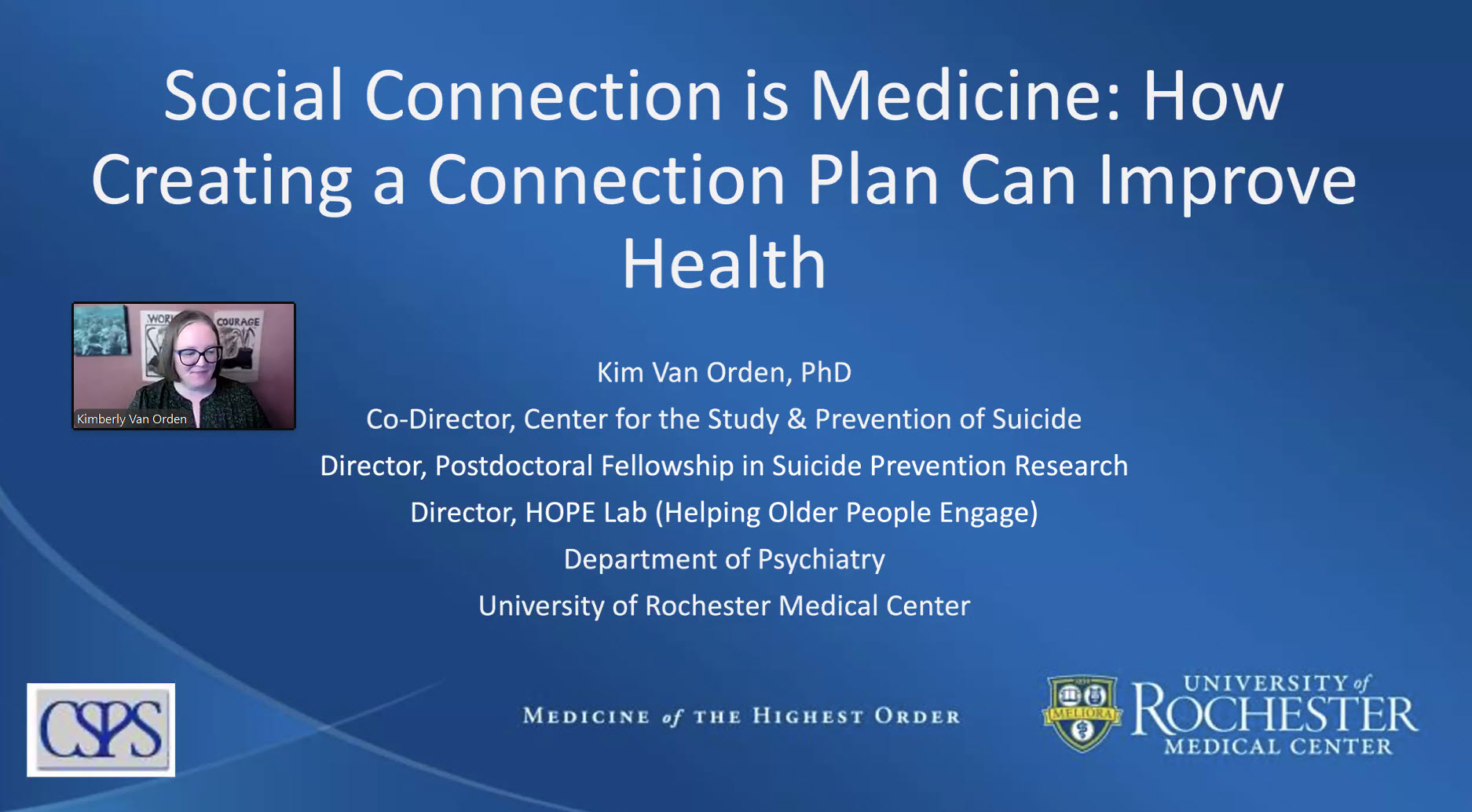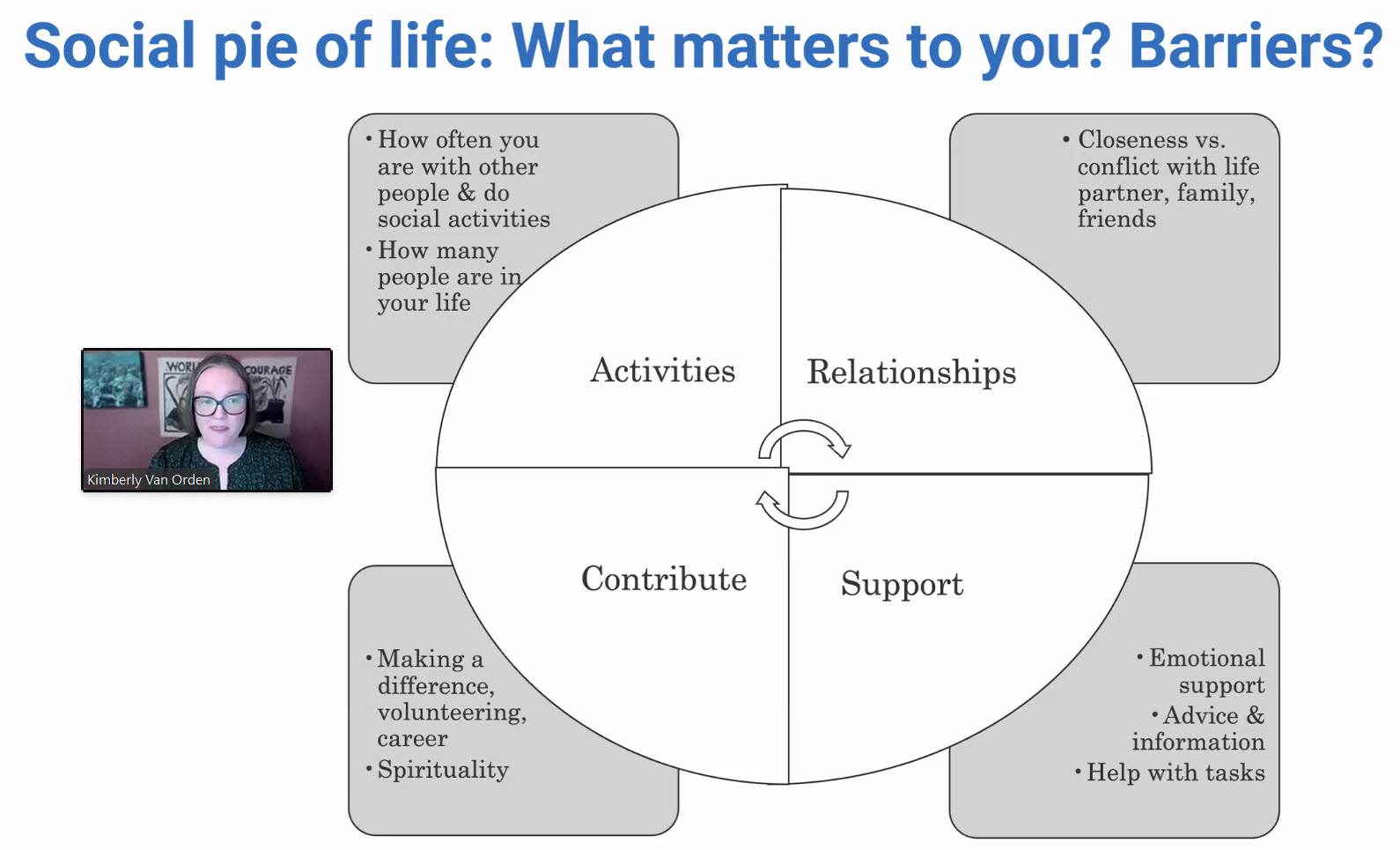AARP Hearing Center
Most people think of medicine as a pill “we might take in the morning or the evening to promote our health,” said Kim Van Orden, an associate professor of psychiatry at the University of Rochester Medical Center.
But she says social connection is medicine, too. Maintaining relationships with friends and family members and being part of a community can “have a range of benefits for our health, our well-being, and even how long we live.”
“Social connection is really just as important as having food and water and shelter. It’s a basic human need. And when we don’t have those connections, it can actually be very scary,” Van Orden, who directs the HOPE Lab (Helping Older People Engage) at the medical center in Rochester, New York, said during a recent webinar organized by AARP Virginia.

The online event, held Aug. 15, was titled “Social Connection as Medicine: A Connection Plan.” Van Orden, who earned a doctorate in clinical psychology from Florida State University and has won research awards from the American Association of Suicidology, outlined strategies to reduce or prevent loneliness and isolation and to bolster health and well-being.
Van Orden, who grew up in Fairfax County, noted that in 2023, then-Surgeon General Vivek Murthy issued a report titled “Our Epidemic of Loneliness and Isolation.” It said that older people are among the groups at the highest risk for social disconnection.
Seventeen percent of American adults age 65 and older are isolated, and 46% of women age 75 and older live alone, said Van Orden, the co-director of her university’s Center for the Study and Prevention of Suicide.
“Today, loneliness is more widespread than other major health issues in the U.S.,” she said.
But it’s never too late to address the issue.
“Social connection remains malleable throughout our lives,” and people can create plans to overcome loneliness and expand relationships and a sense of community, Van Orden said. She added that the benefits of doing so are profound: Social connection improves physical and mental health and “reduces the risk of premature mortality.”
Van Orden led the webinar’s attendees through exercises that involved:
● Reflecting on how often and whom they connect with; the physical and emotional support they get from their connections; how they feel about those connections; and things that obstruct or facilitate social connection.
● Creating a connection plan. Participants brainstormed “ways you can connect with others,” including visiting family members, meeting friends for coffee, going to church or concerts, and bicycling or doing yoga with a group.
“There may be parts of our health that are more challenging for us to directly change, but social connection is something that we always have some control over,” Van Orden said. “So the fact that it impacts all these domains of our health is really exciting because it gives us something that we can do to feel better.”
People with strong social connections report fewer chronic health conditions like high blood pressure or cardiovascular disease, and they are far less likely to develop dementia, Van Orden said.
“We find that people who have stronger and more meaningful and higher-quality connections are less likely to report depression and anxiety,” she said. “There’s lots of data linking social connection to suicide risk – so people with better connections are less likely to have thoughts about killing themselves, to try to take their own life, and dying by suicide.”
Living a connected life doesn’t mean you must constantly be with other people.
“Everyone has slightly different needs for connection. To get the health benefits, you don’t need to become an extrovert or spend time with people all the time. Some of us have a need for solitude, and that is absolutely okay,” Van Orden said.
She said research shows that people benefit even from brief social encounters, like chatting with the checkout clerk at the grocery store or the person who drops off your mail.
“Those actually have huge benefits for how connected we feel and even our health. They’ve been shown to relate to better physical function and mobility. So absolutely – big and small connections have a huge effect,” Van Orden said.

Other speakers at the webinar were:
● Carl Hamiel, an associate state director for AARP Virginia. He moderated the event.
● Erin Gallagher, founder of Jay Walkers, a non-profit dedicated to suicide prevention. She helped organize the online seminar.
Hamiel relayed to Van Orden questions from webinar attendees. One attendee said that at age 71, “many of my friends and family have passed away or moved. Any suggestions to increase social connections after a lifetime of stable relationships that are dwindling?”
“My heart goes out for you,” Van Orden replied. She said people in such circumstances might “start small … like trying to wave to people on your porch, or if you live in a senior living community, saying hi to people.”
“Just like if you were starting an exercise program, you wouldn’t start by running a marathon. So start building up your social connection muscles slowly,” she said. Later, for greater social connection, people might do volunteer work or join social groups with shared interests or activities.
Resources to address loneliness and social connection
Connect2Affect, an initiative of the AARP Foundation, provides tools to see whether you are affected by social isolation and resources for living a connected life, such as inviting friends and neighbors for a potluck dinner.
You can use the “Pie of Social Life” form – which looks at activities, relationships, contributions and support – to assess your situation and devise a plan to expand your social connections.
The Center for Mindfulness at the University of California, San Diego, offers audio and video exercises to practice self-compassion and kindness meditations.
The Greater Good Science Center at the University of California, Berkeley, also has a series of multimedia exercises to “strengthen feelings of kindness and connection toward others.”
Jay Walkers is a national nonprofit dedicated to suicide prevention. Each September, which is Suicide Prevention Awareness Month, the organization sponsors the Jay Walkers Challenge, a healthy competition “to walk and talk in hopes of breaking down the stigma of suicide.”































































